Our Metaverse Identity Solution
The metaverse has been a topic of conversation for decades, with novelist Neal Stephenson coining the term in his 1992 bestseller ‘Snow Crash’. More recently, Facebook’s rebrand to ‘Meta’ has seen even more people talking about the metaverse and what immersive virtual reality might look like.

As the metaverse develops and expands, having a digital identity that preserves privacy and provides security will be vital. Veriff has been preparing for our role in helping keep everyone safe while they live their lives online, but what does the metaverse future hold, and what conditions might its users face? We have studied the metaverse's potential impact on sectors ranging from entertainment to dating, gaming to ways of working; we would like to share key predictions on the risks and opportunities, alongside our solutions to help build a safe metaverse for everyone.
Entertainment
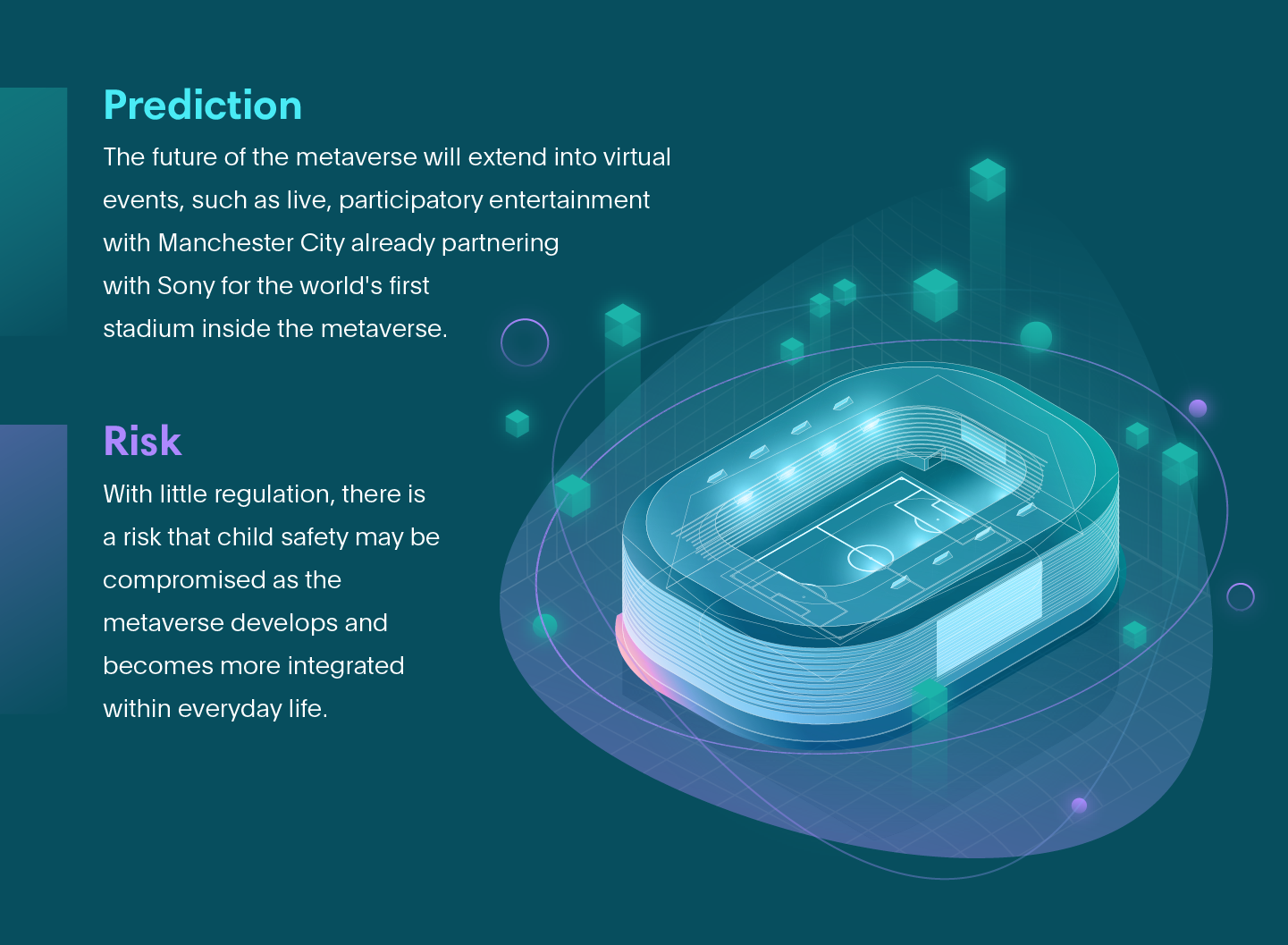
From sporting events to music concerts, the metaverse will be an immersive, global hub for the world’s greatest entertainment. The key to brand success in the metaverse will likely be timing, with early adopters attracting and growing a strong follower base before their competition. When it comes to football, one early adopter is Manchester City which has already partnered with Sony to develop the world’s first metaverse football stadium. Another company said to be exploring a metaverse future is Disney. The company's famous park, Disneyland, could one day be replicated in immersive virtual reality, allowing families and friends to enjoy their favourite rides and shows no matter where they are in the world.
Although there will no doubt be age restrictions in place for virtual events and venues, a big risk for entertainment within the metaverse will be child safety. The online world of the metaverse will be a constantly evolving environment, making it incredibly difficult for parents, guardians, and companies to ensure the protection of younger users. Global regulations will need to be improved and adapted to allow companies and governments to act where needed, without compromising overall user privacy.
Dating
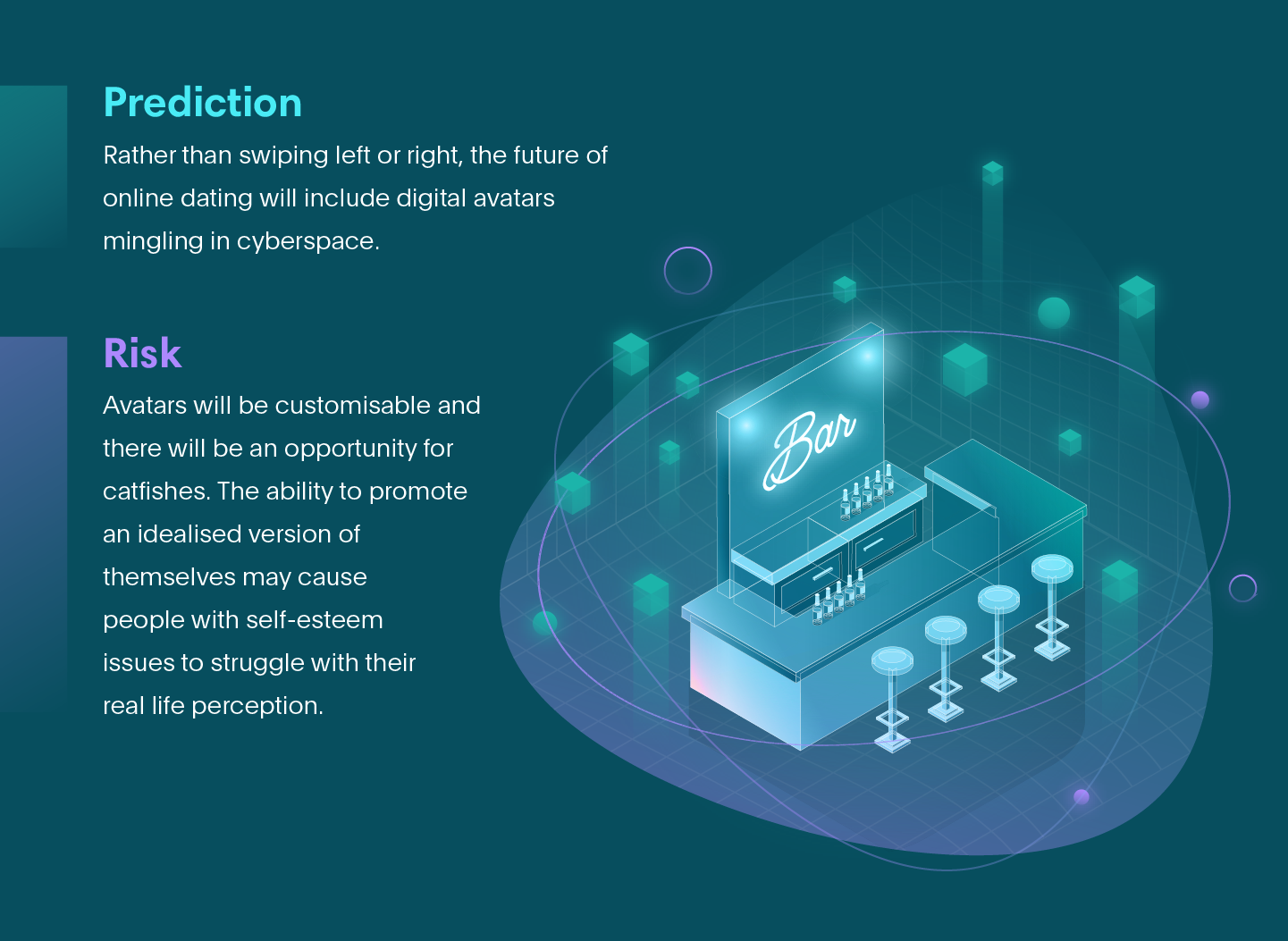
The future metaverse could be a great way for people to create meaningful connections without ever meeting each other in real life. In fact, Fire Flare Games are in the process of building Planet Theta, a VR-based dating app expected to launch soon. Instead of meeting the person you've been interacting with online - which comes with its own safety risks - you will be able to meet them in a virtual, immersive date environment.
Even though dating in the metaverse offers people a safer option than the real-life alternative, it will still have its risks. As avatars will be fully customisable, they won’t necessarily resemble the person you are actually talking to, so current issues such as ‘catfishing’ (where people set up a fake profile online that doesn’t reflect who they are, to trick people who are looking for love) will likely be even more prevalent. Alongside this, experts believe that those with self-esteem issues could use the metaverse to expose an idealized version of their physical appearance, negatively impacting their perception of themselves in the real world.
Verifying who someone is when dating online can be tricky. There have been many cases recently which involve romantic scams and users may be hesitant to date in a virtual world. Veriff’s metaverse identity solution can ensure only honest users are present in the metaverse and can prevent users from creating multiple accounts if they are reported.
Retail
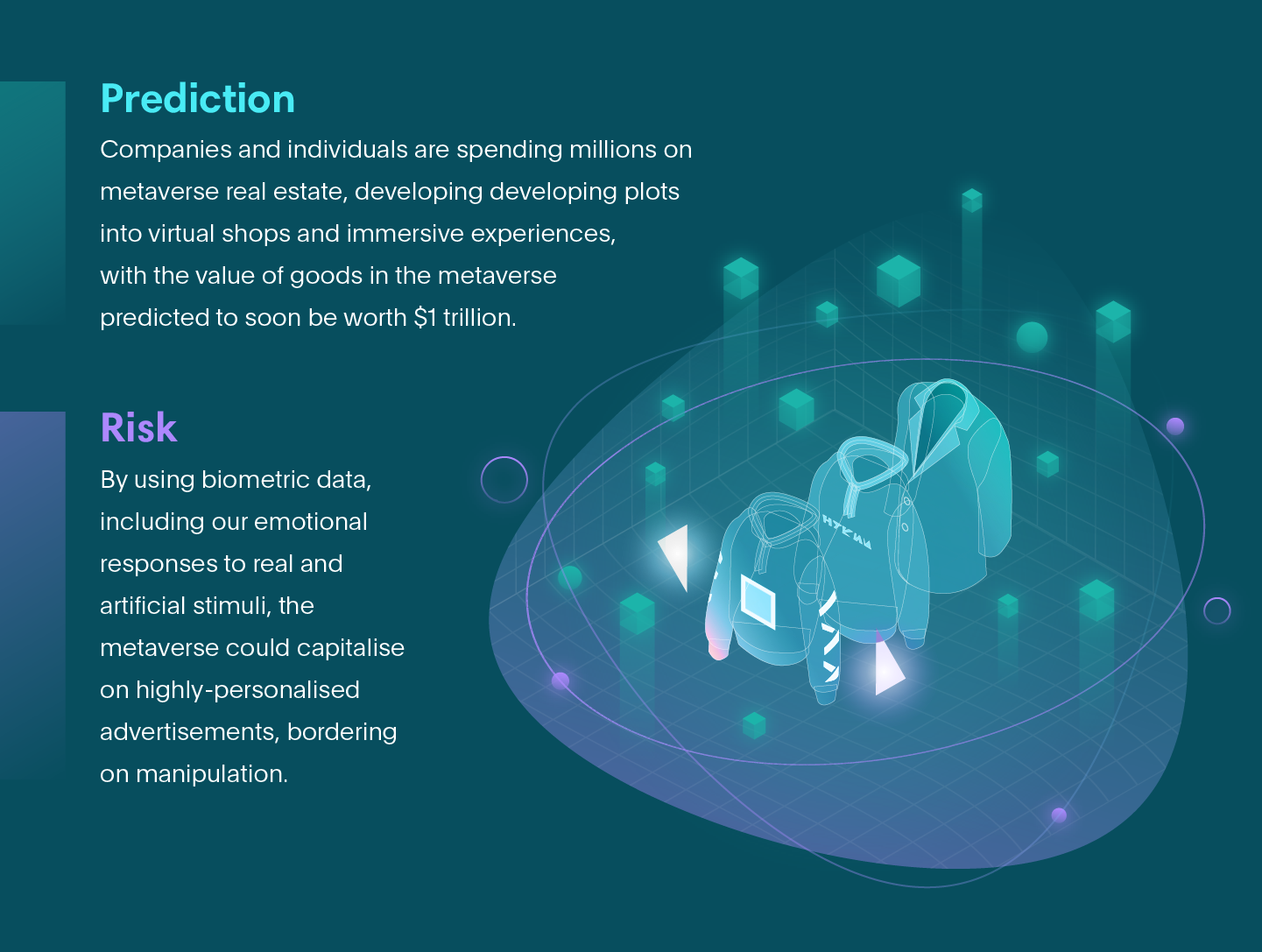
The value of goods in the metaverse is predicted to soon be worth $1 trillion, so it’s no surprise that retail will be a big part of our virtual reality future. In virtual worlds, such as Decentraland and Sandbox, companies and individuals are already spending millions on metaverse real estate, with plans to develop virtual shops and immersive experiences for users. Brands and celebrities will be able to create new and immersive ways to connect with their followers on a global scale, without the ‘real-world’ restrictions of things like travel and physical production.
The current ethical problems we face with targeted advertising could be heightened in a metaverse environment. Without regulations, advertising in the future could be so integrated into virtual interactions that users won’t even notice that they are being advertised to, blurring the line between consent and manipulation. The use of biometric data, including users’ emotional responses to real and artificial stimuli, could also be monetised for advertising purposes.
Businesses and individuals will need to work to ensure that they are able to operate safely online. In a similar way to how adverts have become regulated for the way we use the internet currently, it’s likely there will be regulations in the metaverse. It’s also important for users to stay savvy and think critically about whether what they are being presented is an advert or not. Businesses will need to make sure they have measures in place to protect themselves and their customers using solutions such as Veriff’s biometric authentication.
Education

The pandemic has prompted a new, remote future for education with collaborative online spaces and digital learning tools. The metaverse could offer even more potential for learning and collaboration between teachers and students, making education increasingly accessible.
Despite the many positives of metaverse education, including cheaper tuition and remote learning, there is a greater risk of the circulation of misinformation. Problems that plague conventional social networks today, such as the spread of fake news, could appear even more convincingly in the metaverse, making it increasingly harder for users to tell fact from fiction.
One way to prevent this is by knowing exactly who you’re interacting with, helping to protect real users from fake accounts and bots who could potentially be spreading propaganda. Veriff’s multi-account prevention identifies and stops repeat offenders from creating new accounts, only allowing honest users within the metaverse.
Work
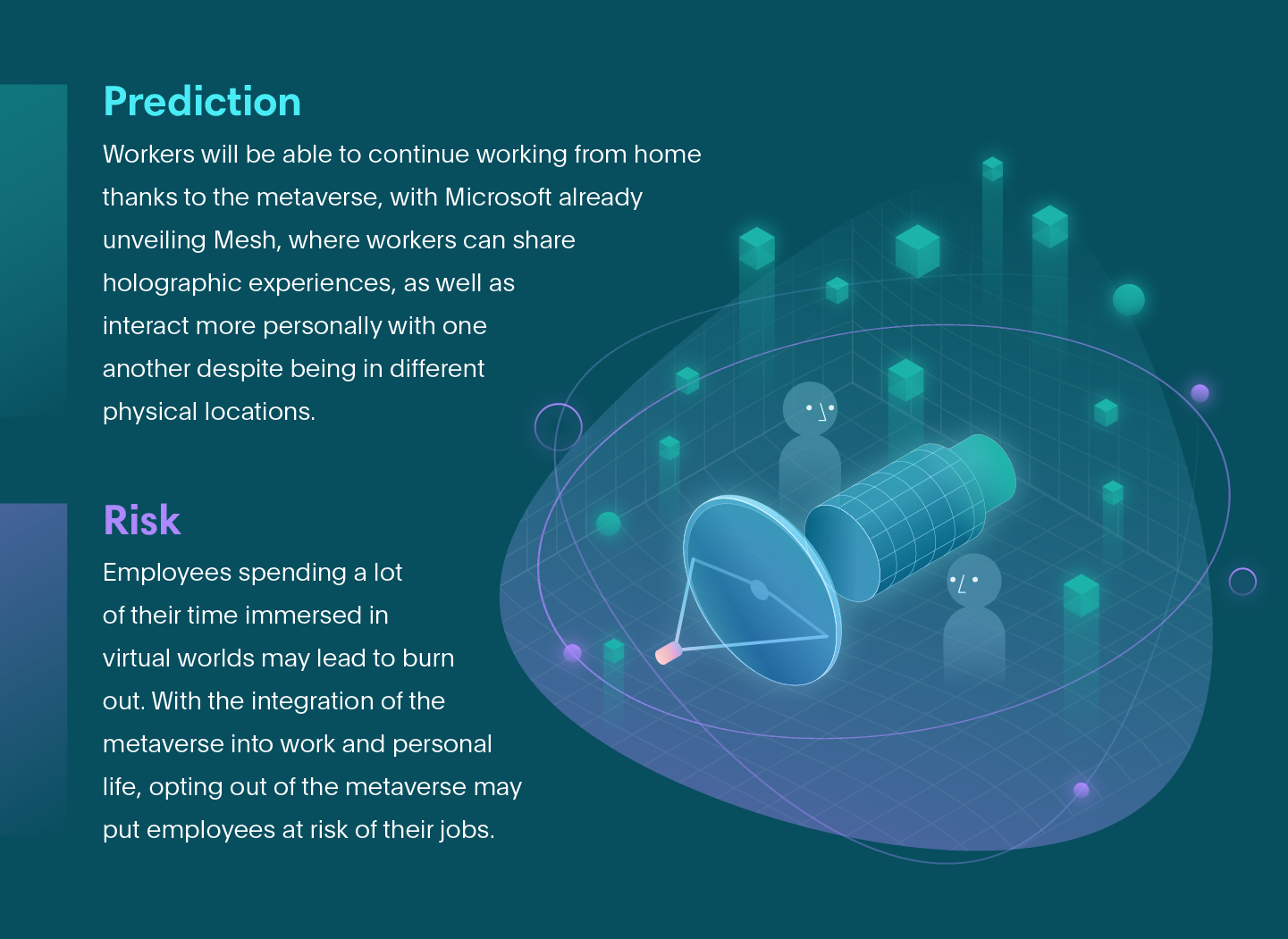
Remote working will take on a whole new form in the metaverse, with organizations investing in immersive and realistic virtual environments for their employees. Some experts believe that remote workers will also become more productive in the metaverse as they benefit from the ‘in-person’ experience of a real-world office from the comfort of their homes.
As work and the metaverse become increasingly integrated, some people may also find it harder to retain or find work if they are less able to join the metaverse, either due to a lack of equipment and infrastructure or personal hesitation.
While Veriff can assist in securely onboarding employees to create safe digital workplaces, securing your business’ safety, there are extra steps companies may need to take. For example, a company's HR department will have to adjust to the new working environment to suit the needs of the employees, ensuring they are supported in the new immersive approach to online working.
Ownership
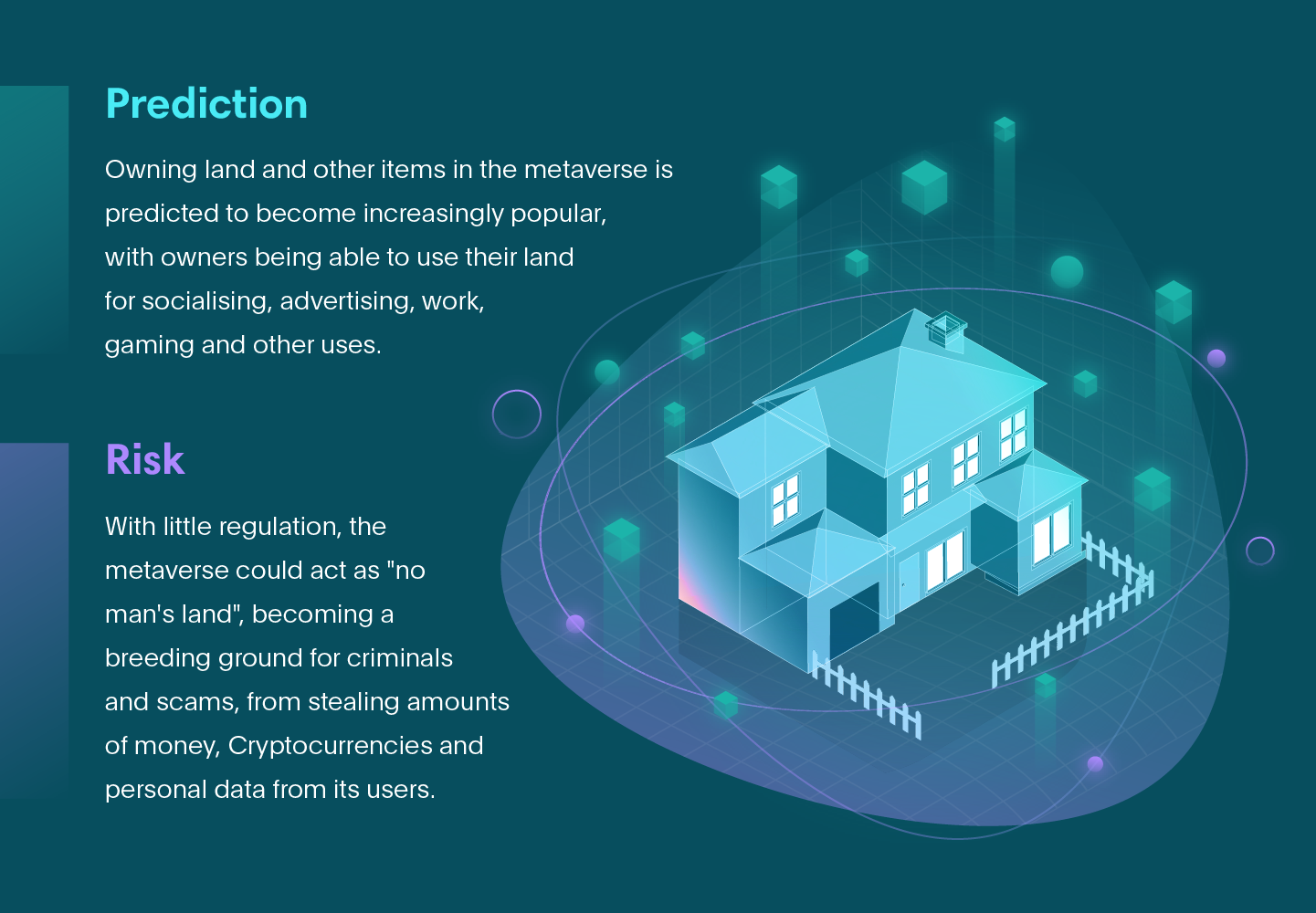
Real estate in the metaverse is purchased using Non-Fungible Tokens (NFTs) and virtual ‘landowners’ can use and monetise their space for things like socializing, advertising, work, and gaming. Despite land ownership in the metaverse predicted to become increasingly popular, much like the news we see today around NFT artworks, protecting the ownership of such an investment will create new challenges for users and businesses.
Without proper regulation, the metaverse could act as "no man's land" for financial crime, with a constantly evolving threat of fraud and scams. Without the proper protection, users could be at serious risk of regular Cryptocurrency theft, personal data theft, and identity fraud.
Steps are already being taken to ensure the metaverse is a safer space for all of its users. Veriff has already kicked off first use cases with top metaverse companies to ensure safety on their platforms, providing solutions to discard bots and block sold accounts so that metaverse users can be certain that they are interacting with real people within the digital environment.
Gaming
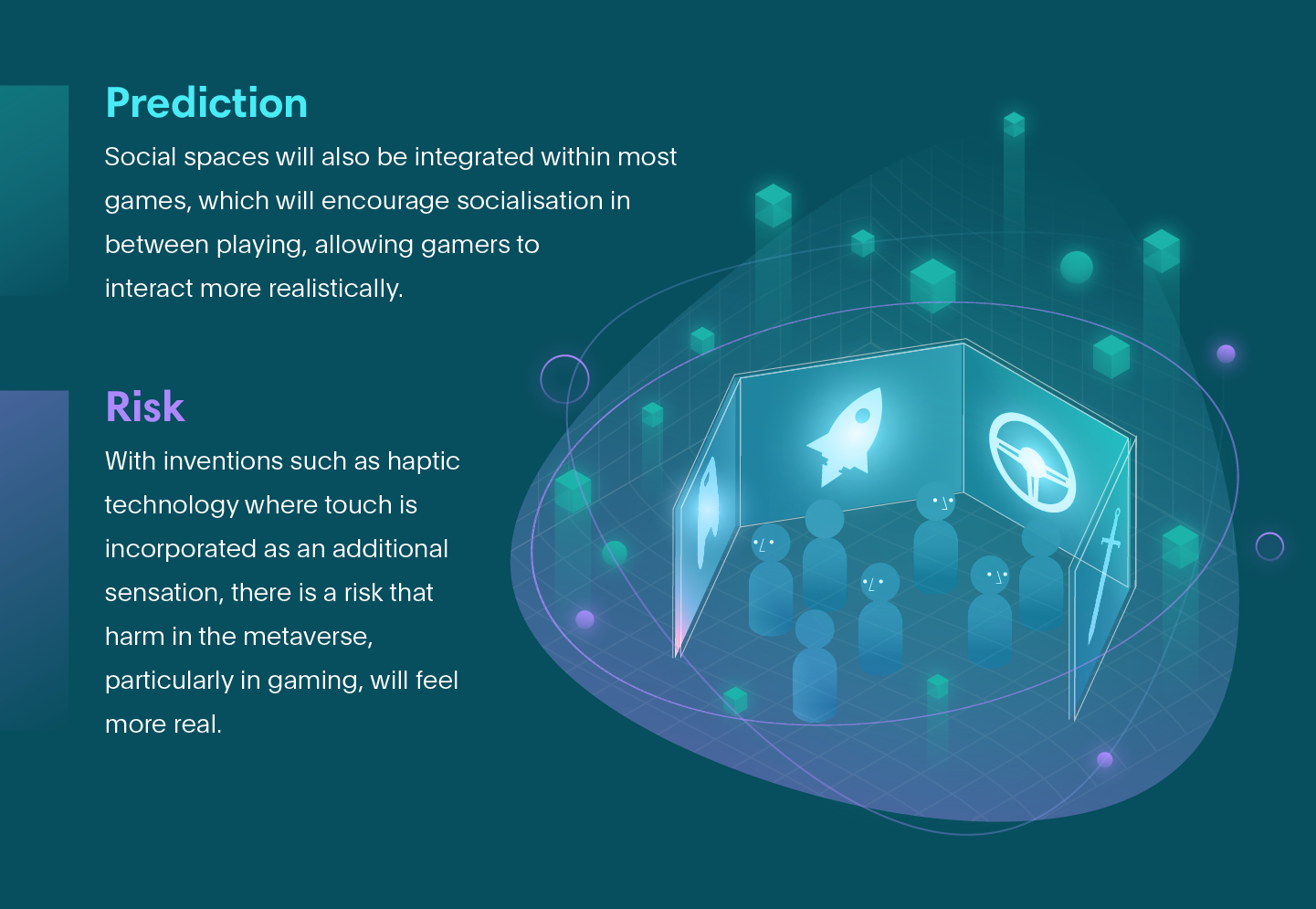
Online games will no longer be closed ecosystems, with the items you earn or buy in games following you throughout the metaverse. Social spaces will also be integrated within games, allowing players to interact with each other while playing to create a more immersive social environment.
Online abuse and bullying in the gaming community is a current issue that will likely become more problematic in the metaverse. As technology develops, concerns around unwanted contact and the impact it may have on mental health are growing among experts.
Integrating Identity verification sets higher user accountability and helps prevent online bullying. Not only does Veriff’s technology help to verify the identities of metaverse users, but it will also protect underage users, especially young children, from inappropriate or age-restricted content or from people pretending to be someone else online. Alongside user age verification, parent and guardian verification can also be required to protect children from the beginning of the journey, making the metaverse more transparent and secure for its younger users. These steps will help gaming companies provide online entertainment, including age-gated content, while ensuring that only verified customers are participating.
If you are interested in learning about how we can support you with a metaverse identity solution then visit our industry page.


